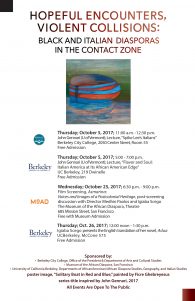Hopeful Encounters, Violent Collisions: Black and Italian Diasporas in the Contact Zone - Oct. 5, 25, and 26 @ BCC

Admission is Free! All events are open to the public
Thursday, October 5, 2017; 11:00 am - 12:30 pm, BCC Room 55
John Gennari Lecture: Spike Lee's Italians
View more on the Arts & Cultural Studies Department News page
Hopeful Encounters, Violent Collisions: Black and Italian Diasporas in the Contact Zone
Thursday; Oct. 5, 2017
- John Gennari (U of Vermont); “Spike Lee’s Brooklyn”; 10:30am-12pm; Room 55, Berkeley City College
- John Gennari (U of Vermont); Flavor and Soul: Italian America at Its African American Edge), 5-7pm; Dwinelle Hall, UC Berkeley
Wednesday; Oct. 25, 2017
- Medhin Paolos (filmmaker) presentation and screening of her documentary Asmarina @ the Museum of the African Diaspora, San Francisco
Thursday; Oct. 26, 2017
- Igiaba Scego (author); presentation of the English translation of her novel, Adua; UC Berkeley
Sponsored by:
· Berkeley City College, Office of the President & Department of Arts and Cultural Studies/Humanities Program
· Museum of the African Diaspora, San Francisco
· University of California Berkeley, Departments of African American/African Diaspora Studies, Geography, and Italian Studies
IMAGE painting by Ficre Ghebreyesus
series title inspired by John Gennari, 2017
Hopeful Encounters, Violent Collisions: Black and Italian Diasporas in the Contact Zone
This series of events explores the connections of intimacy, violence, cultural creativity, and political struggle that link together the African and Italian diasporas--from the influence of African American musical traditions on Italian American singers, to the influence of Black diasporic resources on contemporary Afro-Italian struggles for recognition, to the mobilizations of Eritreans in the United States and Italy to unearth hidden histories of Italian colonialism. Through presentations, film screenings, and book talks, this series approaches “Afro-Italy” as a complex, global contact zone.
About Flavor and Soul: Italian America at Its African American Edge
(by John Gennari, Chicago University Press, 2017)
In the United States, African American and Italian American cultures have been intertwined for more than a hundred years. In Flavor and Soul (University of Chicago Press, 2017), John Gennari spotlights this affinity, calling it "the edge." Through studies of music and sound, film and media, sports and foodways, he shows how an Afro-Italian sensibility has nourished and vitalized American culture writ large, even as Italian Americans and African Americans have fought each other for urban space, recognition of overlapping histories of suffering and exclusion, and political and personal rispetto. It is only at such cultural edges, Gennari argues, that the nation can come to truly understand its racial and ethnic dynamics.
About Asmarina (documentary film, 2015, directors, Medhin Paolos and Alan Maglio)
The Eritrean/Ethiopian community has been present in Italy for at least half a century and it has been actively integrated into the social and cultural life of the city. Starting from the collective memories of the community, on the ground of photo documents, the film gathers together the legacy of personal stories, exploring the different shades of identity, migration and the aspirations of the people. The result of Alan Maglio and Medhin Paolos' research is a collective tale which brings to light a postcolonial heritage that has been little scrutinized up to now: the everyday life stories of those who have lived in the city for years, those who were born in Italy and the daycare of the refugees who have just arrived. The film makers approach this reality empathically and get involved in it, patiently trying to create a relationship with the protagonists. The research and the filming of Asmarina lasted one year and a half and are based on direct witness accounts and the survey of audiovisual material taken from personal and institutional archives.
About Adua (English translation, New Vessel Press, 2017)
Adua, an immigrant from Somalia to Italy, has lived in Rome for nearly forty years. She came seeking freedom from a strict father and an oppressive regime, but her dreams of becoming a film star ended in shame. Now that the civil war in Somalia is over, her homeland beckons. Yet Adua has a husband who needs her, a young man, also an immigrant, who braved a dangerous crossing of the Mediterranean Sea. When her father, who worked as an interpreter for Mussolini’s fascist regime, dies, Adua inherits the family home. She must decide whether to make the journey back to reclaim her material inheritance, but also how to take charge of her own story and build a future.

